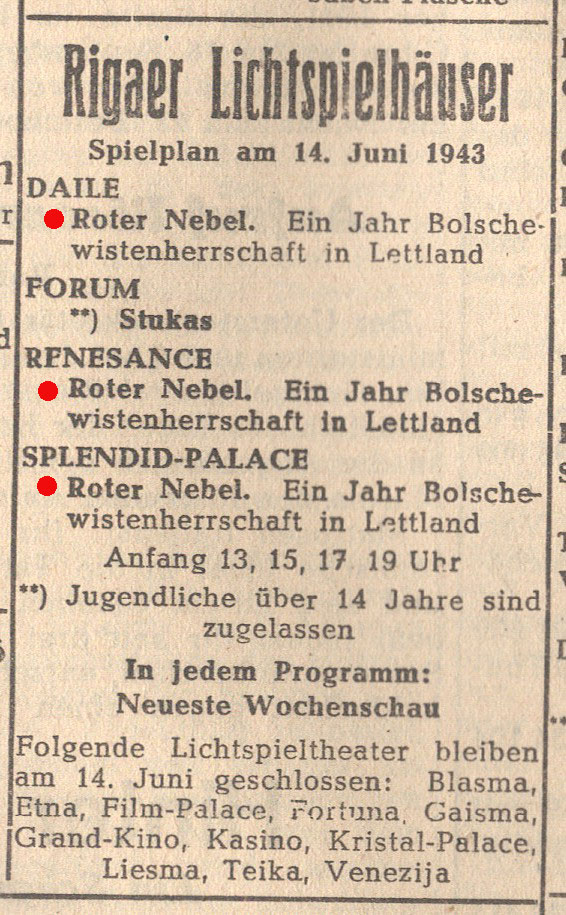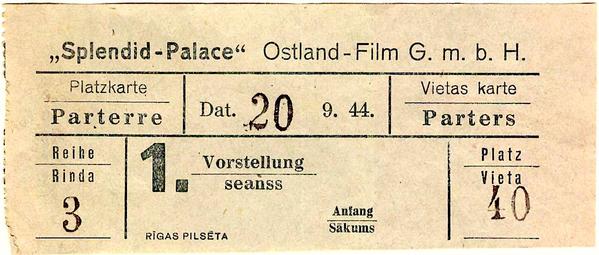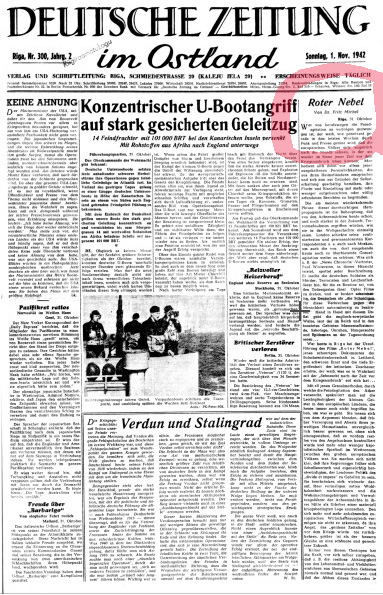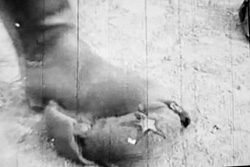- Home
- POSTER GALLERY
- ❗️BOOK & POSTER STORE❗️
- About the Posters
- The William Gillespie Collection
- Our Publishing House
- ❗️GFDN interviews author and collector William Gillespie ❗️
- Our most expensive & inexpensive finds!
- ❗️***NEW!*** Poster of the Month ❗️
- ❗️NEW ❗️Film Posters – Demands on an important means of film advertising. ❗️
- In our Book + Zeitschrift Library
- ❗️ ***NEW!*** Hitler Youth Quex – A Guide for the English–speaking Reader ***NEW!*** ❗️
- ❗️***NEW!*** Table of Contents of our new HJ QUEX book❗️
- ❗️Hitler Youth Quex Guide - early praise! ❗️
- Recent loans from the Collection
- Farewell Horst Claus. (1940–2024)
- "Der Deutsche Film" Zeitschrift
- ❗️ ***NEW!***German "Tendency" Films (Tendenzfilme) in the Third Reich ❗️
- KARL RITTER
- Karl Ritter original film posers in this Collection
- "Besatzung Dora" ( † 1943)
- "The Making of The Crew of the Dora"
- Karl Ritter at the 1938 Reichsfilmkammer Congress
- INDEX -"Karl Ritter" book, 2nd edition
- Karl Ritter's Legion Condor (1939, unfinished)
- Excerpt from our "Dora" book
- ∆∆∆∆∆ High praise for our DORA book! ∆∆∆∆∆
- TABLE OF CONTENTS – "Legion Condor"
- § § § § § Early Praise for our LEGION CONDOR book! § § § § §
- ❗️"Das Leben geht weiter" and Karl Ritter ❗️
- Zarah Leander Europe–wide !
- Japan Military Film and Karl Ritter
- Karl Ritter after 1945
- 1935 Film Congress
- Poster Exhibition in Berlin, March 1939
- Potsdam poster exhibition 12 April–25 August 2019
- Leni Riefenstahl's two "Olympia" Films (1938)
- "Ohm Krüger" (1941)
- Emil Jannings
- "Blutendes Deutschland" (1933)
- Hannes Stelzer ( † 1944)
- Klaus Detlef Sierck ( † 1944)
- Film stills
- Reich Film Censorship Offices
- ❗️Dateline: Ufa - April 11, 1945 ❗️
- ❗️***NEW!***The Fate of the German Film Industry in May 1945 ❗️
- Film censorship cards
- Film Archives
- Cinema advertising
- School filmstrips
- ❗️UPDATED❗️ Z F O / Ostland Film G-m-b-H
- Z F O / Herbert Jacobi estate
- ZFO / Ostland Film newspaper articles
- ❗️***NEW!*** Roter Nebel / Red Fog / Red Mist (1942/1943, ZFO) ❗️
- ZFO - Der Rückkehrer - The Returnee (1943/1944)
- The D F G production company
- D I F U
- ❗️ ***NEW!*** "Carl Peters" – Special Collection. ❗️
- "Alcazar" (1940, Genina)
- "Der 5. Juni" (1943, banned)
- ❗️ ***NEW!*** Herbert Selpin and his "Titanic" (1943) ❗️
- ❗️ ***NEW!*** Ein Robinson (1940, Fanck) ❗️
- "Fronttheater" (1942)
- Veit Harlan's Jud Süß and Fritz Hippler's Der Ewige Jude
- Harlan "Jud Süß" trial 1949
- Werner Krauss & JUD SÜß
- Anti-Semitic Film Posters in the Collection
- "Heimkehr" (1941)
- "Hitlerjunge Quex" (1933)
- ❗️***NEW!*** Hitlerjunge Quex in 111 Greater Berlin Cinemas ❗️
- Jürgen Ohlsen
- "S.A.Mann Brand" (1933)
- "In der roten Hölle" (Edgar Neville, 1939)
- "Helden in Spanien" (1938)
- The Spanish Civil War in Film
- Andrews Engelmann (1901 – 1992)
- Deutsche Wochenschau
- Uƒa Feldpost
- Uƒa Kulturfilm – Informationen
- " Die Tochter des Samurai" (1937, Fanck)
- Ufa 25th Anniversary
- Invitations to world premieres
- ❗️***NEW!*** Continental Films, Paris 1940–1944 ❗️
- Film Censorship in Occupied Paris 1942
- "Der Sieg des Glaubens" (1933)
- Wilhelm Althaus Estate
- Weimar Germany posters
- Ufa and the Ordensburgen
- The Gaufilmstelle in our Collection
- "Zwei Welten" (1940)
- "Capriccio" (1938) –Karl Ritter film album
- Unrealised NS Propaganda Films 1934–1945
- German Film Directors accused of "war crimes"
- Australian––themed NS feature films
- "Der Störenfried" / "The Troublemaker"
- What was new in 2014?
- What was new in 2015?
- What was new in 2016?
- What was new in 2017?
- What was new in 2018?
- What was new in 2019?
- What was new in 2020?
- What was new in 2021?
- What was new in 2022?
- What was new in 2023 ?
- What's new in 2024?
- ❗️***NEW!*** Hitler assassination attempt in Karl Ritter film cut❗️
- BESATZUNG DORA private photos
- Just discovered 1942 article on BESATZUNG DORA
- The Karl Ritter Tetralogy
- Google Analytics 2023
- Our first–ever acquisition!
- ❤️"Some of our favourite things....!"❤️
- ERRATUM for our " Hitler Youth Quex Guide"
- Trending
- Vale †
- Our Wants List / 2024 / Wunschliste
- Pop Quiz
- Unsere KARL RITTER Bücher in Deutschland liefbar!
- WHERE to buy our books right now?
- ✉️Contact
 “History is not about the facts. It is about the context and who is telling the story.” —Prof. Milton Fine.
“History is not about the facts. It is about the context and who is telling the story.” —Prof. Milton Fine.
"Who controls the past controls the future: who controls the present controls the past." –– George Orwell in his novel "1984."
"Whoever doubts the exclusive guilt of Germany for the Second World War destroys the foundation of post–war politics." –– Prof. Theodor Eschenberg, Rector, the University of Tübingen.
"If we have our own why in life, we shall get along with almost any how." – Friedrich Nietzsche
POSTER GALLERY --view
over 500 German film
original posters between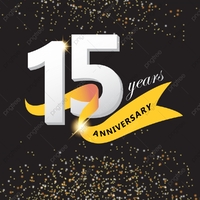
1927–1954 from
Germany and from
many Axis and Neutral countries
across Europe!
Note! Posters in the Poster Gallery are PERMANENT
acquisitions which are NOT FOR SALE!! ONLY the
posters listed in our POSTER STORE are for sale.
(They have a price and order button to use.)
Red Fog / Red Mist / Roter Nebel (1943, ZFO)

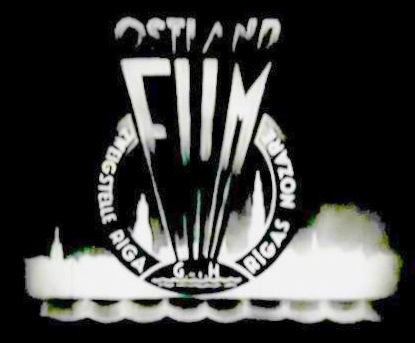
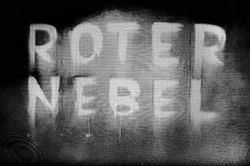
The Ostland Film GmbH production company in Riga produced a 36 to 44 minute anti–Bolshevik film that outlined the sordid history of Bolshevism imposed in Latvia and the Baltic States in the 1920s, and the brutal Soviet atrocities inflicted on the civilian populations after the Red Army re-occupied those lands in early 1940. This film was aimed at the Baltic State audiences in their own languages, and in Russian and Ukrainian for those occupied areas.
Red Fog [ film review ] by Dr. Fritz Michel Riga, October 31
Those of us who are forced to pursue the enemy agitation by professional means, know how penetrating the radio and the press have been sounding in the last few weeks that the European peoples are supposedly longing for the hour in which they can live again in the sense of the time before the outbreak of war. In doing so, they mainly make use of those persistent personalities who have emigrated from their home countries and are now busily trying to justify their escape and attitude with more or less exaggerated or completely fabricated reports for reasons of preservation.
Anyone who experienced the seriousness and deep emotion of the Latvian audience at the world premiere of the film "Roter NebeI,” that gruesome document of the Bolshevik rule in Latvia, knows what the truth for the "longing for the time before the outbreak of war“ is about ... With all the recent atrocity methods through which the fine agitation contaminates the ether, one speculates on the gullibility of the little spirits in the European countries, who today still have not understood what it is about. They allow themselves to be blinded by the argument that the supply and sale of their respective homeland used to be incomparably better, without admitting that it was previously completely controlled by the Anglo-Saxons and that it was more or less a capitalist plaything in the race between the great European peoples. They fail to realize that their governments used to belittle themselves as a love-servant, and selfish to please the London policy of "divido et impera". Rather, they limit themselves to mourning their former wealth and to regard the members of the Wehrmacht and administrative leaders of the Axis powers in their midst as the originators of a materially war-related situation. They fail to recognize economic compensation, as their fear that the "golden age" of before the war would never return is greater than a better belief in a brighter and more just future. [excerpt from the full review in the above newspaper.]
Later, as many as twenty further versions of Red Fog aimed at specific European audiences were produced or at least planned; including French, Finnish, Italian, English, Spanish, Polish, Serbian, Czech, Croatian, Slovakian, Danish, Greek, Hungarian, Bulgarian, Dutch, Flemish, Swiss German, Norwegian, Turkish. Swedish and Portuguese. These versions were about half of the length of the original version produced in Riga. Due to the fact that a forty minute documentary on the history of Baltic Bolshevism would have been too long for European audiences, more succinct use of that footage allowed the film to establish and show Bolshevik horrors and then segue into a narrative which stated that other nationalities in Europe were also under danger.
Of these non–Baltic, non–Russian "foreign versions," to date only a handful have surfaced: French, Swedish, German, and Flemish. It is not known whether most of the other language versions were in fact ever realised before the tide turned against Germany.
Inexplicably, the version for German audiences in the Reich itself was not approved by the Censorship Office until late December 1944 and published on Feburuary 24, 1945! Here is the official.announcement in the Berlin film newspaper of record Film-Nachrichten:
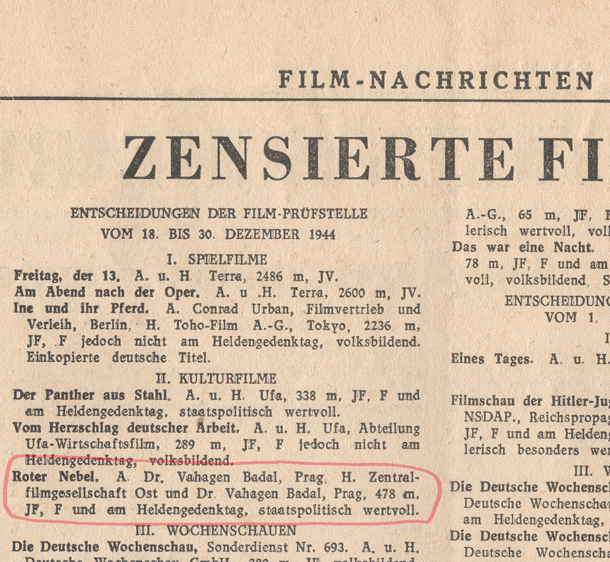
Below are screenshots from the original Latvian version in our library:
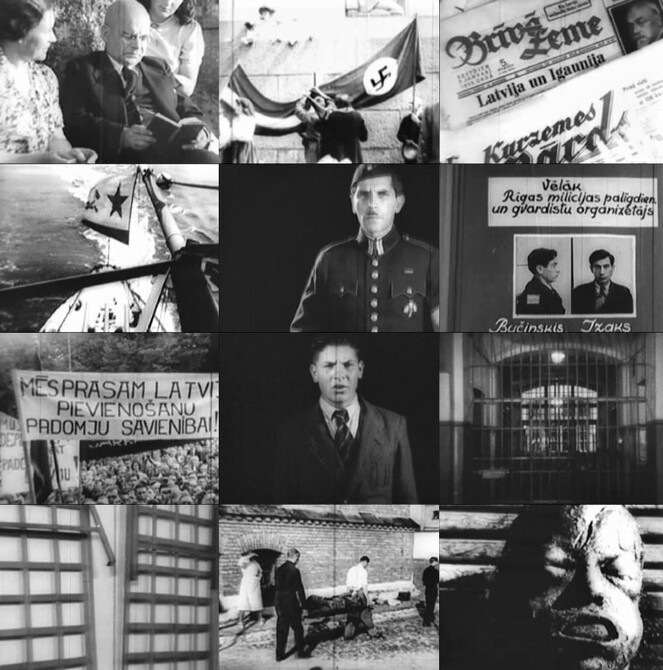
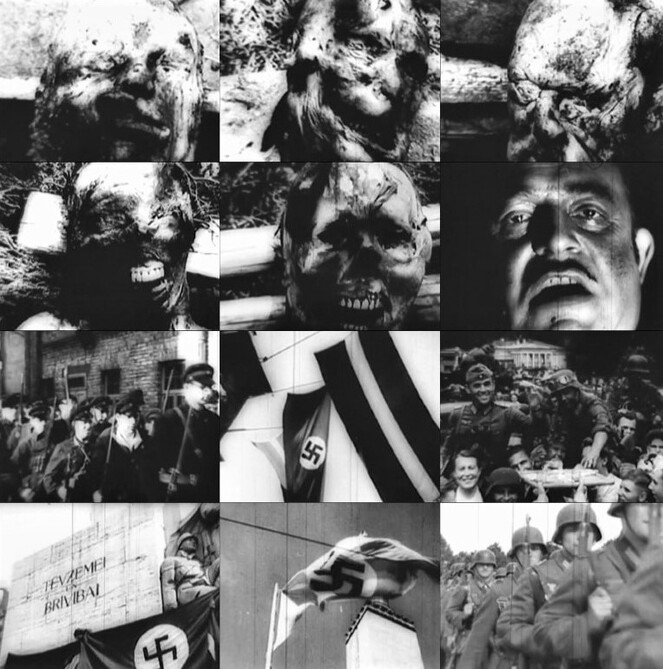
The film ends with the crushing of the hated Red Army Ushanka cap with its hammer & sickle red star badge by victorious marching soldiers:
Below are screenshots from the 15 1/2 minute shorter Flemish language version in our library:
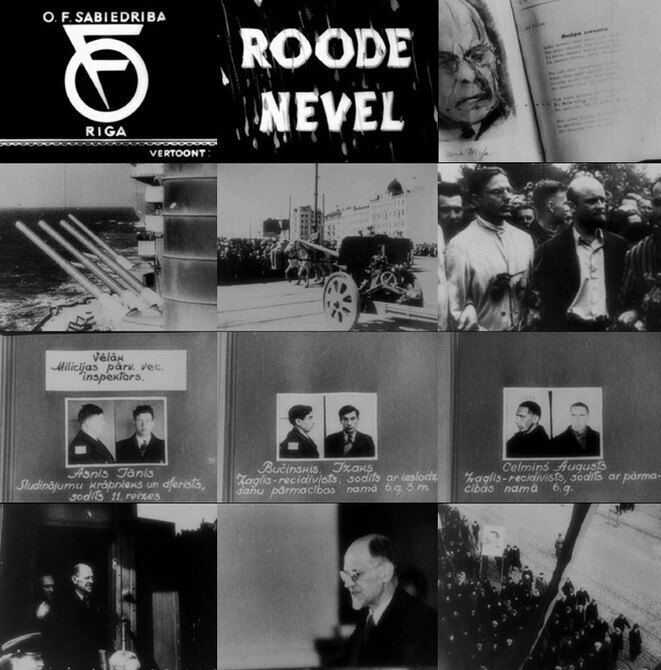
Below are three screenshots which seque the anti–Bolshevik history of the Baltic States to the pending threat to Flemish culture, churches, and heritage sites and to the Flemish people:
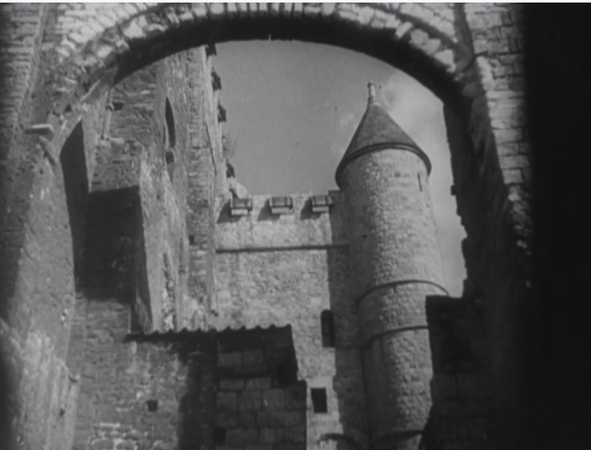
Proud recruits and volunteers for the Waffen–SS in defense of Flanders and Europe:
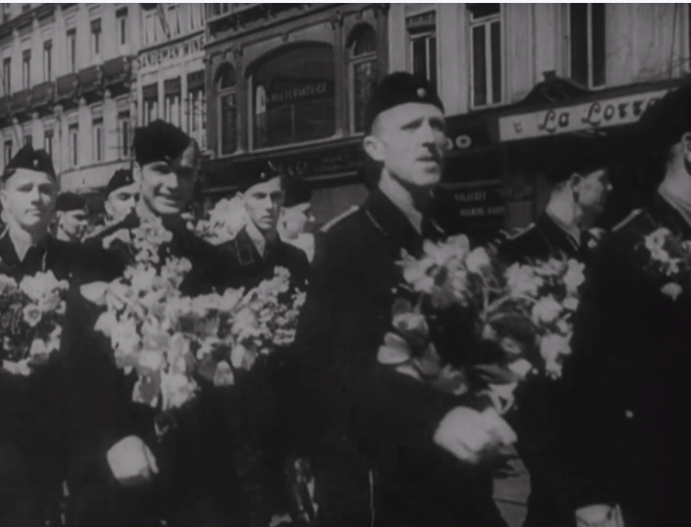
A rousing ending with chorus and flag:
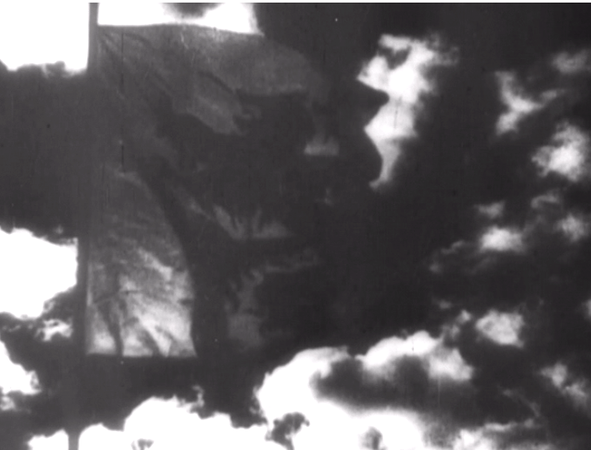
An incredible amount of primary material on Ostland Film and its associated companies can be found on this website here.
